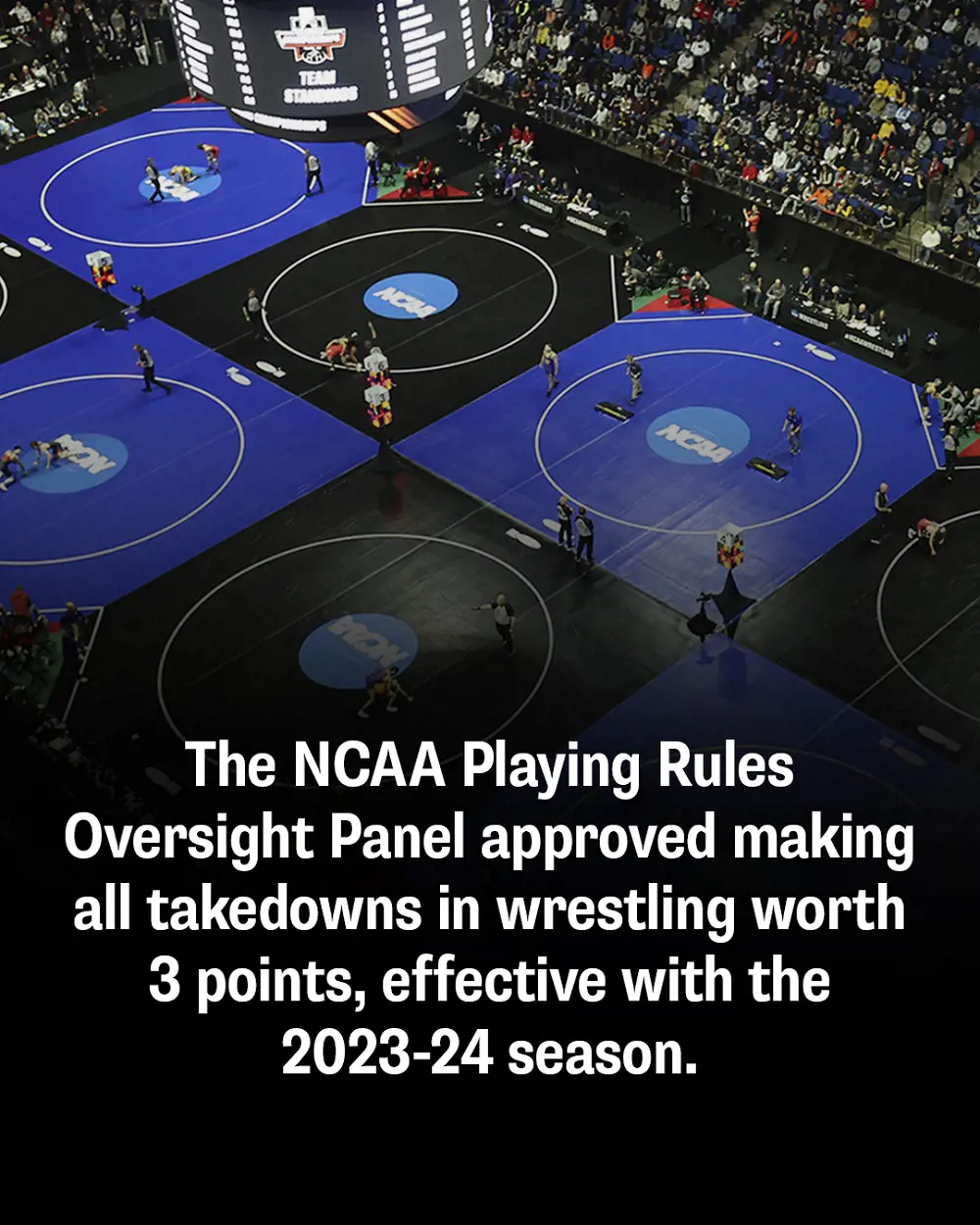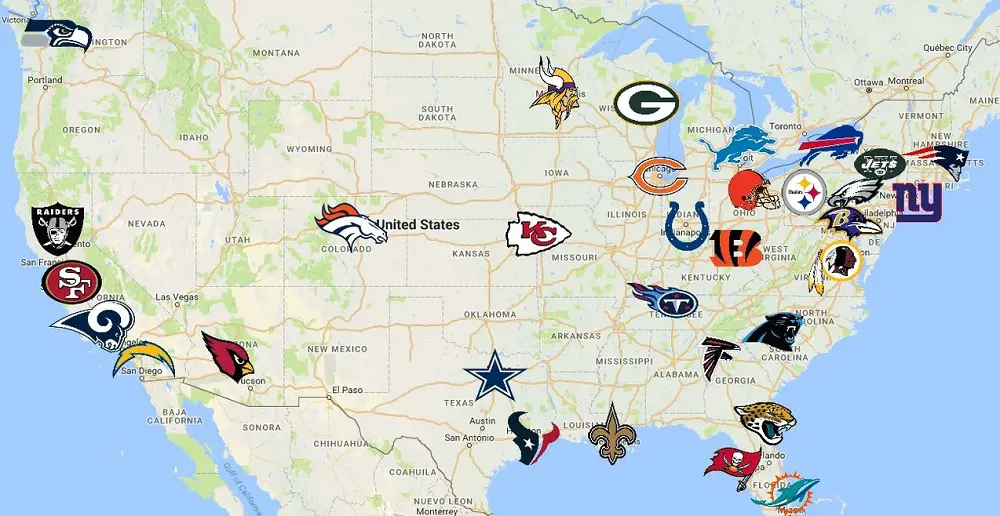NCAA wrestling 3 point takedown will be effective from the 2023-24 season per College Wrestling Committee and Rules Oversight Panel.
The most talked about change is that of the 3 points awarded to the wrestlers instead of the original 2 points. The rule change will surely change the complexion of the game.
A lot of new skills and techniques will be displayed from now on to complete a takedown and earn that extra one point starting this season.
It can be said that these changes are meant to encourage the offensive aspect of the game. The fans will now be able to witness a lot of high-scoring wrestling matches.
It will be interesting to see how the new rules will affect the matches and will determine whether the changes are for the better or worse.
Penn State won the 2022-23 NCAA Division I wrestling team title and the 2023-24 season will have Tulsa as the host city for the tournament.
How Many Points is a Takedown in Wrestling?

NCAA wrestling takedown will now be worth 3 points. The NCAA Playing Rules Oversight Panel has approved the change.
The latest change to the scoring will be effective from the 2023-24 season and is the most common way to score points in a match.
NCAA 3-point takedown is when a wrestler takes their opponent to the ground from a neutral position and has complete control of the opponent on the mat.
There are various forms of takedowns in wrestling:
- Single leg
- Double leg
- Snapdown
- Arm drag
- Slide-by
- Duck under
- Spin around
- Leg trips
How many points is a takedown before the change? A wrestler was awarded 2 points for a takedown and has been an original part of wrestling for a long time.
The new season will have 3 points for a takedown, which mean that we will witness very high-scoring matches from now on as there will be more offensive points available for the wrestlers.
The rule will now encourage wrestlers to take more calculated risks while in the neutral position, and both offensive and defensive takedowns will have an increased opportunity.
Wrestling Hand Touch Takedown Rule In 2023

Wrestling hand touch takedown has also changed as it has been eliminated. It will also come into effect from the 2023-24 season.
Successful takedowns are going to be much more difficult starting this season as wrestlers will have to take full control of their opponent to secure a takedown.
Hand touch takedown and its cancelation does make sense as the governing body wants to make a single requirement for a takedown that showcases control of the opponent which is a crucial component of wrestling.
Attempting a takedown and getting their opponents on their hands was comparatively more straightforward, but ultimately, getting them down will be tough.
Previously, the wrestler, when attempting a takedown, would earn points if the opponent's hands touched the mat and would be considered a successful takedown.
This is not the case now as they will be able to defend themselves better and not lose points with their hands on the ground in a somewhat tripod-like position.
NCAA wrestling rules change that will take place has made it mandatory for the opponent to be down on their knees to be awarded the points.
The governing body also considered the wrestlers' safety while changing the rule.
NCAA Wrestling New Rule Changes For 2023-24 Season
NCAA Wrestling rule changes 2023 has also introduced the new 3-point near-fall scoring effective from the upcoming season.
Previously, the wrestlers were awarded either 2 or 4 points for near-falls and now they will have the 3-point option as well. This will allow the wrestlers to be more creative in collecting points.
In simpler words, a near-fall in wrestling is when an offensive wrestler has almost pinned the opponent but not wholly.
The offensive wrestler is awarded points when he has his opponent in a weak position and turns them past 45 degrees for some time.
NCAA wrestling new rules that will be effective from the 2023-24 season:
- Medical Forfeit
- Delayed video review
- Placement matches
- No stoppage after the penalty
- Five-second count
- Weigh-ins
- Weight certificate
- Facial hair
- On-the-mat Stalling
- Video review
Wrestling changes this year will have quite a few changes that encourage the offensive aspect of the sport.
In the context of the first medical forfeit from a tournament, it will be counted as a loss on the wrestler's record. If the injury occurs while in a tournament, an exception will be made.
The coach's delayed video challenge request review will now result in a loss of the review; previously a 1-point deduction from the team total was the penalty and was a control-of-mat violation.
The final team score will remain unchanged regardless of any accurate placement matches that will take place in the event.
Officials can now penalize an illegal hold and let the action continue until scoring is complete. The match will not be required to be halted if the wrestlers are not at risk.
Previously, whenever the top wrestler held the ankle of the bottom wrestler, the referee counted to mandatory five seconds. From now, this rule will be applied to all positions and not limited to the waist and ankle ride.
Previously, tournament weigh-ins were two hours or earlier before the start of the competition, and the dual meet weigh-ins were conducted an hour or earlier. The new rule is that all weigh-ins will be done two hours or earlier for all competitions.
Starting from September 1, all schools will be permitted to conduct weight certification.
Previously, wrestlers were not allowed to have facial hair longer than half an inch. This rule has now been eliminated.
The objective of the new rule is to make both the offensive and defensive wrestlers equally responsible for actively seeking points through near-fall or pins. Previously, the offensive wrestler only had to gain control of the opponent and not aim for more points.
The new rule is to change all calls or the ones they missed during a video review challenged sequence. The referees now have the authority to do so.


